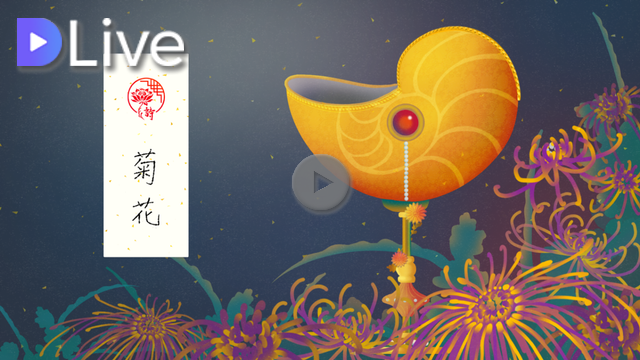Chinese poem - “The Chrysanthemum” by Li Shangyin (Includes original song and video) | 《菊花》- 李商隱 (內有原創樂曲及影片)
It’s been a week since the World Cup started, how are you doing with the predictions? I’ve haven’t done well at all, so went for a walk in the garden as they say beautiful flowers can make you happier. What do think of when you see flowers? Beauty? Dazzling? Or how short life can be? In ancient China, poets often gave life and characters to different flowers, let’s take a look at this week’s poem and you will understand what we mean.
世界盃過了一週了,暫時的賽果有讓你們大跌眼鏡嗎?我有!為了排解心中所結,我走到了附近的花園賞花排壓。花,給你的意義是什麼?美麗?璀璨?還是生命的短暫?花,各有形態,各有特色,在古代的中國,詩人早已為各式各樣的花賦予各自的性格和內涵。
The Background 創作背景
In Chinese literature, plum blossom, orchid, chrysanthemum and bamboo are collectively known as the four gentlemen’s virtues. In particular, the chrysanthemum represents the carefree hermit.
When Li Shangyin wrote The Chrysanthemum, he had just left his official position, and was on a break at home. His situation was similar to Tao Yuanming and Luo Han, two scholars before his time, both who were keen horticulturist particularly with chrysanthemum. Yet, unlike Tao Yuanming and Luo Han who were happy to spend the rest of their life in recluse, Li Shangyin still wanted to make something of his career. He used the chrysanthemum characteristics of defying hardship and mortality as an analogy for his desire to return to an official position again.
在中國文學作品中,「梅蘭菊竹」象徵君子的四種美德,其中「菊花」象徵超然灑脫的「世外隱士」。
李商隱寫《菊花》時,剛辭去了弘農縣尉的官職,居於家中,終日流連山水。他當時的景況正好跟陶淵明辭官歸隱後在籬邊採菊相似,亦讓李商隱想起羅含致仕歸鄉後隱居茅舍的,事蹟。
然而李商隱不甘心像陶淵明、羅含一樣隱居種菊渡過餘生,於是借菊花不畏寒霜、只爭朝夕的特性,代入自己的想法:要把握時間,早日重歸廟堂,發揮應有的作用。
The Chrysanthemum by Li Shangyin 李商隱《菊花》
暗暗淡淡紫,融融冶冶黃。
àn àn dàn dàn zǐ , róng róng yě yě huáng
陶令籬邊色,羅含宅裏香。
táo líng lí biān sè , luó hán zhái lǐ xiāng
幾時禁重露,實是怯殘陽。
jī shí jīn zhòng lù , shí shì qiè cán yáng
願泛金鸚鵡,升君白玉堂。
yuàn fàn jīn yīng wǔ , shēng jūn bái yù táng
The Composition 詩句大意
The Chrysanthemum consist of 8 lines and is best explained in 4 parts.
《菊花》共八句,按詩的結構劃分,可分為四個層次。
Part 1 : The chrysanthemum’s colour 層次一:菊花的顏色
「暗暗淡淡紫,融融冶冶黃」
àn àn dàn dàn zǐ , róng róng yě yě huáng
There are light shades of purple, and sharp colourful yellow chrysanthemum
解釋:這裡有暗淡的紫色菊花,也有鮮豔的黃色菊花。
Part 2 : Chrysanthemum and predecessors 層次二:由菊花聯想到的名人
「陶令籬邊色,羅含宅裏香」
táo líng lí biān sè , luó hán zhái lǐ xiāng
Like the colourful chrysanthemum by Tao’s garden fence, and the fragrant chrysanthemum at Luo’s home
解釋:有陶淵明籬邊菊花的色彩,也有羅含家裡菊花的香氣。
Part 3 : The chrysanthemum’s properties 層次三:菊花的特質
「幾時禁重露,實是怯殘陽」
jī shí jīn zhòng lù , shí shì qiè cán yáng
Chrysanthemum isn’t afraid of the morning dew, but is afraid of the sunset
解釋:菊花不怕露水的沾溼,實際是害怕夕陽的來臨。
Part 4 : Chrysanthemum’s contributions 層次四:菊花的貢獻
「願泛金鸚鵡,升君白玉堂」
yuàn fàn jīn yīng wǔ , shēng jūn bái yù táng
It is used to make wine and served to the noble guests in a beautiful shellshape gold beaker
解釋:願意製成酒液盛於黃金仿鸚鵡螺形鑄造的酒杯,來到高貴的宴席之上。
The Poetic Structure 格律特點
Sentence 句式
There are 8 lines in this poem and each word have 5 words making this a five word lushi
全詩共八句,符合律詩八句的句式特點。而全詩每句均是工整的五個字,可先將此詩納為「五言律詩」。
Parrallelism 對仗
This is another characteristic of lushi. The third and fourth lines, and fifth and sixth both have parrallelism. For example Tao vs Luo, garden fence vs home, and colour vs fragrance in the third and fourth lines. Whilst in the fifth and sixth lines we have is afraid vs isn’t afraid and morning dew vs sunset.
「律詩」的第二個特徵,是頷聯(三、四句)與頸聯(五、六句)必須對仗工整,詞性相對。
《菊花》的頷聯是「陶令籬邊色,羅含宅裏香」,「陶令」對「羅含」,人物(名詞)對人物(名詞);「籬邊」對「宅裏」,名詞對名詞;「色」對「香」,名詞對名詞,對仗非常工整。
《菊花》的頸聯是「幾時禁重露,實是怯殘陽」,「幾時」對「實是」,副詞對副詞;「禁」對「怯」,動詞對動詞;「重」對「殘」,形容詞對形容詞;「露」對「陽」,氣象(名詞)對氣象(名詞),亦是有頗具心思的對仗。
The Music and Drawing 歌與畫
The colour theme of our drawing this week is purple and yellow as per the chrysanthemums in the poem. The Cantonese version of the song is performed by @tine, whilst Mandarin is by our guest performer @susanlo. Hey @susanlo how about joining our team permanently? The mood of the song is quite sad to reflect the short life span of the beautiful chrysanthemum and the poet’s frustration in not being able to fully utilise his talents and abilities. However, we end the song on a more jubilant note with a duet to reflect both their endurance in not giving up and doing the their best.
這次的畫風依照詩中比較強調的紫和黃為主色,歌曲的粵語部份由@tine所唱,而國語則是@susanlo,看來@susanlo將會是我們的長駐主唱了!曲風以淒美感覺為主,一方面表達鮮花生命的短暫,同時襯托作者心中的懷才不遇。不過,縱然一時落魄,但仍無損作者的堅持,故我們在歌曲最後選擇了以雙聲二重音強調作者的心聲,就算一時失意,最後仍會像鮮花的紫和黃一樣,充滿色彩,如同畫中鸚鵡螺形酒盃,綻於生命的美麗。
Highlight of the Poem 精選句子
「願泛金鸚鵡,升君白玉堂」
yuàn fàn jīn yīng wǔ , shēng jūn bái yù táng
During life we sometimes find ourselves going through less successful periods and doubt ourselves. Li Shangyin tells us that we shouldn’t feel dejected at these times, and that we should seize the moment and continue to do our best. Carpe diem.
As the chrysanthemum withers away they can still be used to produce fine wine to serve noble men. So, whenever you are feeling down, just remember not to give up, there is always light at the end of the tunnel.
人生在世上,尤其風燭殘年時,到底還可以發揮什麼貢獻?李商隱告訴大家,不應因面前的潦倒落泊而感到失意,更應在這時發奮立志,把握機會與時間,實現自己未完成的夢想。
我們經常會埋怨自己懷才不遇,慨嘆自己沒有機會發揮自己的長處。但原來一朵凋零的菊花,枯萎的花瓣依然可以製成高貴的菊花酒液,重登大雅之堂。因此我們不應輕易放棄,繼續向自己的目標進發吧!
As we go through peaks and throughs in life, we must remember what goes up can also come down. So don’t be complacent during peaks nor depressed during throughs, otherwise you may end up like some of the traditional strong football nations. Of course, it’s not the end of the game yet, so who knows what the final result will be? Next week, we will continue with another football theme Tang poem.
我們的一生有起有伏,總有低谷,總有高潮,但我們不要為一時失意而落寞,也不要為一時失意而驕傲,否則就會如何那些傳統足球強國一樣,一失足成千古恨。當然,賽事未完,誰勝誰負仍是未知之數,讓我們下回繼續足球主題,看一看更多唐詩裡的蹴鞠故事!
Production Team 製作團隊
Literature Translation 詩歌解析: @perlia
Music 音樂: @kona
Art 插圖: @nanosesame
Video 視頻: @aaronli
English Editor 英語編輯: @livinguktaiwan
Chinese Editor 中文編輯: @aaronli
My video is at DLive





A A 幾時買酒杯
淘寶中
Love 💕
thanks for your love!!!
没读过李商隐这首诗,受教了。
这首诗写的还真是委婉哪,作者通篇都在以菊自比。
首联写菊之美,也可看做作者的自矜。
颔联说陶潜和罗含,都是德行高洁之人,意思是我老李也是同道中人。
颈联就更明显了,老李我不怕艰难辛苦,就怕时光虚度。
所以尾联说,给个机会呗,封个一官半职的我一定跟着您干。
这首诗和孟浩然的“坐观垂钓者,徒有羡鱼情”异曲同工。
只不过老孟先用如椽大笔描绘洞庭的壮观美景,扯点有的没的显显才情,然后突然一个一百八十度大转弯,暗示丞相大人我要为朝廷做贡献,给个机会。
老李就比较直肠子,我就像那菊花一样德高材美,就直说吧了您给我个官。
要面子的文人,腼腆起来真是无底线哪ʘᴗʘ
不过中国诗歌之美,就美在这个腼腆上了。
另外,我感觉“愿泛金鹦鹉”的意思是,愿做酒杯里漂着的菊花瓣,这样更解释的通~